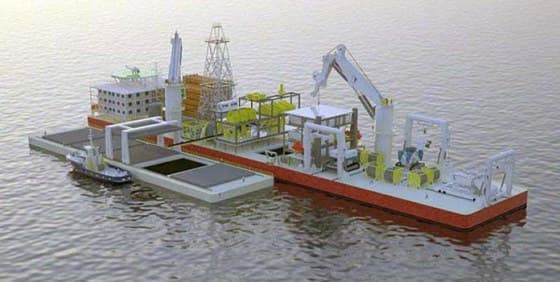Jury still out on whether seabed mining is good for Pacific

Source: Radio NZ
The Pacific Community says it is still not clear whether the potential economic benefits of sea bed mining will outweigh the negative effects on the environment and on local livelihoods.
The comments come after the SPC's proposed legal and regulatory framework on sea bed mining was accused of neglecting indigenous and environmental safeguards.
Koroi Hawkins looks at some of the pros and cons of the industry.
According to the company involved, in 2018 Papua New Guinea's Bismarck Sea is set to host the first ever commercial deep water mine operation.
The director of the Pacific Community's [SPC's] geoscience division, Mike Petersen, says Nautilus Minerals' Solwara 1 project will set the tone for the future of the industry.
MIKE PETERSEN: They will be the pilot everyone will be looking at them not only the people we are talking about here, you'll have the NGO's who may not wish this development to happen but also industry will be looking at it, government will be looking at it, environmentalists will be looking at it the fishing industry and others will be looking at it so it is under a lot of scrutiny actually.
But an outspoken PNG opposition MP, Gary Juffa, who is the governor of Oro province, says the Solwara 1 project is being steam-rolled by the government without any consideration for relevant regulations or legislation.
GARY JUFFA: There is no legislation that would allow the government or the communities to have avenues by which they can review, monitor and take action if necessary or penalise etc, nothing at all. You know, here we are embarking on this project completely blind.
One regional NGO strongly opposed to the Solwara 1 project is the Pacific Network on Globalisation.
Its coordinator, Maureen Penjueli, says there are too many unknowns and seabed mining legislation in Pacific countries is either non-existent or insufficient.
MAUREEN PENJUELI: If you look at advanced jurisdictions like New Zealand and Australia it is very clear that when they apply the law in relation to sea bed mining it sets out very precisely. What it means for for indigenous peoples what is means for environmental protection etc. So we believe very strongly that at this particular point in time in history the Pacific is not their yet to pursue seabed mining.
Mike Petersen says as a regional scientific body the SPC is neither pro- nor anti-seabed mining.
But he says as to the viability of the industry studies indicate seabed mining could be a profitable undertaking for Pacific countries and he suggests it has a comparable industry in the offshore oil sector.
MIKE PETERSEN: In the 1970s underwater petroleum extraction was considered to be science fiction and something which humans would never make money from or maybe could never achieve. If petroleum the petroleum industry can succeed then why not the mineral industry given technological advances, advances in robotics and so on and so forth.
PNG's Gary Juffa however says in the blind push to get the project up and running the views of local indigenous peoples have been ignored.
GARRY JUFFA: Are we to just sit back and despair and moan and groan and whine and there is the government no longer serving its people but serving corporate pirates. Is this the situation now that we must accept?. These are questions that people are asking, you know, the people of the Pacific.
Other countries in the region interested in seabed mining are Tonga and the Cook Islands with the latter currently in direct talks with several companies after an open tender last year failed to get any bids.
